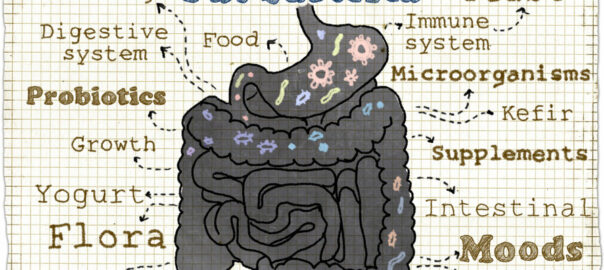The Importance of Good Gut Bacteria

When we think of bacteria, we often think of illness and infection. However, there are many bacteria that are essential for the normal functioning of our bodies, especially our gastrointestinal system. We are just scratching the surface of what we know about gut bacteria and the role it plays in our overall health, but research so far is clear – without a diverse ecosystem or microbiome of gut bacteria, every system in our bodies is negatively affected.
Good Gut Bacteria Allows You To:
- Digest our food properly
- Absorb nutrients from our food
- Dispose of waste efficiently
- Fight off bad bacteria in the digestive tract
- Keep body systems in balance
Gut Bacteria Affects the Entire Body
Heart
When you eat high-cholesterol foods, like red meat and eggs, the gut bacteria these foods introduce to your microbiome produce a substance that your liver converts into TMAO (trimethylamine-N-oxide). TMAO is suspected of helping cholesterol build up in arteries and other blood vessels, contributing to the development of heart disease.
Kidneys
High levels of TMAO in the blood are also suspected of increasing your risk for kidney disease. As the kidneys lose their ability to filter out waste, even more of the TMAO builds up, causing blood vessel blockages and further kidney damage.
Brain
Researchers have observed what they believe to be communication between the brain and a person’s gut microbiome. Emotions and sensory perception can be affected by even slight changes in the gut microbiome, and some studies even show a link between the gut microbiome and conditions like depression, anxiety, and sleep disorders.
Another interesting link between gut bacteria and the brain involves miscommunications that relate to feeling full. Researchers believe the pituitary gland may be affected by these miscommunications, affecting the production of hormones that set appetite.
Gut Bacteria Can be Improved with Synbiotics
Synbiotics are a combination of both probiotics and prebiotics. When used in unison, these supplements complement each other and yield maximum results.
Probiotics
Probiotics are simply additional gut bacteria. Probiotics can come from food sources or supplements in pill, powder, or liquid form. Common food sources of probiotics are yogurt, fermented vegetables, and aged cheeses. Probiotics contribute to the diversity of your gut microbiome.
Prebiotics
Prebiotics are food for probiotics. When taken with probiotics, prebiotics help ensure the probiotics live longer and function correctly. Prebiotics can come from food sources, such as bananas, onions, garlic, leeks, asparagus, artichokes, and soybeans. Prebiotics also come in supplement forms.
Other Ways to Improve Gut Bacteria Include:
Eating a gut-focused diet
Eat a diverse range of foods, including plenty of vegetables, fruits, nuts, beans, legumes, whole grains, cultured foods, and fermented foods. Avoid processed foods and sugary snacks. Limit your intake of red meats.
Fecal transplant
It might sound gross, but fecal transplants can do wonders for patients with imbalanced gut disorders like C. Diff, ulcerative colitis, and Crohn’s disease.
Deep transcranial magnetic stimulation (dTMS)
dTMS involves stimulating the brain to invoke a positive change in gut bacteria. Seemingly pulled straight from science fiction, dTMS has shown promise in combating obesity.
Talk With a Professional About Your Gut Bacteria
To find a medical professional in your area that specializes in using regenerative practices to restore and manage gut bacteria, use the easy search tool at www.regenerativemedicinenow.com. Physicians and complementary medical professionals all over the country have claimed their profiles on our site to connect with patients searching for answers to their health questions, just like you.


